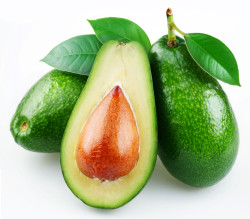Avocado - Plaquenil (Hydroxychloroquine) Interaction
Herbal: Avocado
Also Known As: Persea americana, Abokado, Aguacate, Ahuacate, Alligator Pear, Avocat, Avocato, Beurre du Marin, Palto, Poire Alligator
Drug: Hydroxychloroquine
Brand names:
Plaquenil

Medical Content Editor Dr. Brian Staiger, PharmD
Last updated
Jun 15, 2025
Interaction Details
There were no interactions found between Hydroxychloroquine and Avocado. This does not mean the potential for an interaction does not exist, however. There is often a lack of studies and data surrounding traditional medicine, especially concerning drug interactions, so it is important to always consult your provider before making any changes to your medication regimen.
Avocado Overview
 Avocado, produced by the avocado tree, is a fruit known for its creamy texture and thick, bumpy skin. Commonly consumed as Hass avocados in the US, these fruits weigh between 200 to 500 grams and are rich in oleic acid, akin to almonds or olive oil. Avocado oil, used in cooking, faces quality concerns such as oxidation and adulteration with soybean oil in commercial products. Nutritionally, avocados are high in protein, fiber, and monounsaturated fats, while also containing potassium, beta-sitosterol, and various phytochemicals and vitamins. Studies suggest that avocado consumption may improve cardiovascular health by enhancing endothelial function and reducing postprandial blood glucose. Additionally, avocado compounds like persenone A and B exhibit antioxidant properties with potential chemopreventive effects against inflammation-associated carcinogens.
Avocado, produced by the avocado tree, is a fruit known for its creamy texture and thick, bumpy skin. Commonly consumed as Hass avocados in the US, these fruits weigh between 200 to 500 grams and are rich in oleic acid, akin to almonds or olive oil. Avocado oil, used in cooking, faces quality concerns such as oxidation and adulteration with soybean oil in commercial products. Nutritionally, avocados are high in protein, fiber, and monounsaturated fats, while also containing potassium, beta-sitosterol, and various phytochemicals and vitamins. Studies suggest that avocado consumption may improve cardiovascular health by enhancing endothelial function and reducing postprandial blood glucose. Additionally, avocado compounds like persenone A and B exhibit antioxidant properties with potential chemopreventive effects against inflammation-associated carcinogens.
Hydroxychloroquine Overview
-
Hydroxychloroquine is used to prevent and treat acute attacks of malaria in adults and children weighing more than 31 kg (68 lbs). It is also used to treat discoid lupus erythematosus (DLE; a chronic inflammatory condition of the skin) or systemic lupus erythematosus (SLE or lupus; an autoimmune disease in which the immune system attacks healthy parts of the body such as joints, skin, blood vessels, and organs) and rheumatoid arthritis. Hydroxychloroquine is in a class of drugs called antimalarials and is also an antirheumatic drug. It works by killing the organisms that cause malaria. Hydroxychloroquine may work to treat rheumatoid arthritis and systemic lupus erythematosus by decreasing the activity of the immune system.
Avocado - More Interactions
Avocado interacts with 2 drugs
Interaction Rating Key
These severity listings are for informational use only. Never start, stop or otherwise change your therapy before speaking with your provider.
| Major | The combined use of these agents is strongly discouraged as serious side effects or other negative outcomes could occur. |
| Moderate | Use cautiously under the care of a healthcare professional or avoid this combination. A significant interaction or negative outcome could occur. |
| Minor | Be aware that there is a chance of an interaction. Watch for warning signs of a potential interaction. |
| Unknown | No interactions have been reported or no interaction data is currently available. |
Return to the main supplement interaction checker page
Parts of this content are provided by the Therapeutic Research Center, LLC.
DISCLAIMER: Currently this does not check for drug-drug interactions. This is not an all-inclusive comprehensive list of potential interactions and is for informational purposes only. Not all interactions are known or well-reported in the scientific literature, and new interactions are continually being reported. Input is needed from a qualified healthcare provider including a pharmacist before starting any therapy. Application of clinical judgment is necessary.
© 2021 Therapeutic Research Center, LLC
Drug descriptions are provided by MedlinePlus.
